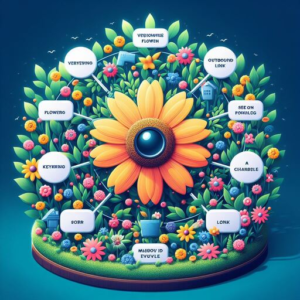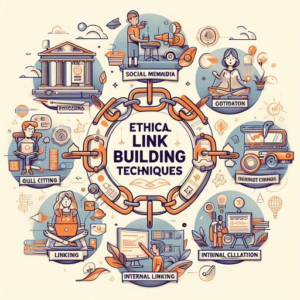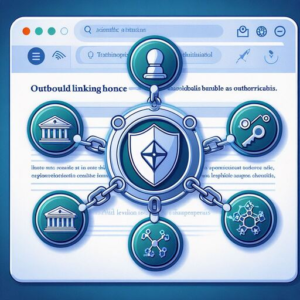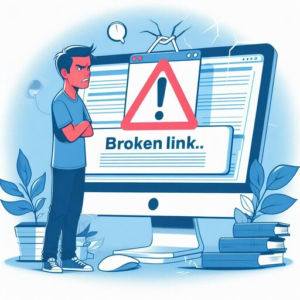Successful SEO methods still rely heavily on link building in the ever changing world of digital marketing. This technique requires you to get backlinks, links pointing to your website, from other websites.
These backlinks are important since they serve as signals to search engines that are specific to how reliable and credible your website is.

We’ll go into great length on the value of link building, how to create high quality backlinks, what makes a good backlink, and how to monitor your link building efforts in this extensive tutorial.
Why Is Link Building Important?
Search Engine Ranking:
The idea behind link building is based on the idea that backlinks are votes of confidence that search engines provide. Higher numbers of high-quality backlinks increase a website’s chances of ranking well in search engine results pages (SERPs). These links are taken into account by Google’s algorithm as markers of a website’s authority and relevancy.

Website Authority:
The authority and trustworthiness of your website may be greatly increased by backlinks from credible and authoritative websites. Reputable websites that link to your material promote your website as a trustworthy and dependable information source. Consequently, this enhances your standing in your sector.
Referral Traffic:
Apart from their SEO advantages, high-quality backlinks send targeted traffic to your website. Referral traffic is any click that comes from another website to yours, giving potential customers another way to find and interact with your content.
Brand Visibility:
Getting backlinks from websites with a lot of traffic and relevance increases the visibility of your brand. By introducing your brand to a larger audience, this exposure helps to build recognition and brand awareness.
How to Build Links:

Asking for Links
This is known as “link outreach” by SEOs, and it involves contacting other website owners and requesting links from them.
However, it’s not possible for you to get in contact with datasciencecentral.com and request that they link to your recipe page for cookies, is it? Websites that are somewhat linked to your page are the ones you should choose since they are more likely to take your request into consideration.
“Link prospecting” is the process of compiling a list of relevant websites to contact. Furthermore, your success rate will increase with the amount of work you put into identifying appropriate outreach targets.
However, why would webmasters of other sites—even those that are pertinent—want to connect to your page?
Ideally, though, you want them to be so delighted with your resource that they will want to connect to it and automatically share it with the people who visit their website.
However, not every page on your website is an original work of art deserving of a thousand connections. As a result, SEO experts have developed a series of strategies to convince website owners to include links on their pages.
Below is a short summary of various strategies and the general thinking behind them:

Write a fantastic piece for their website as a guest post so that you may link back to it from there.
The skyscraper strategy involves locating an antiquated or subpar page that is linked to by several websites. Make your own website one that is more superior. Next, display it to every “linker.”
Building links from resource pages: Look for pages that include comparable resources to yours and submit an addition request.
Broken link building: Look for a defunct page with a large number of links on it. On your own website, develop a substitute and notify all the linkers of it. In a nutshell, that is broken link construction.
Locate websites that have utilised your photos without giving due credit and request a link from them. This is known as picture link building.
Journalists and HARO want that you provide a “expert quote” for their piece.
Unlinked mentions: Request that the brand mention be made into a link.
PR: Offer them a compelling tale to publish.But there’s a catch.
Although the logic and fairness of each of these strategies may seem apparent, you’ll be shocked at how ineffective they actually are. You should feel happy of yourself if, after a hundred outreach emails, you are able to obtain five links.
However, there is one easy thing you can do to tilt the odds in your advantage. This entails establishing connections with members of your industry long before you want their assistance.
Consider it. Would you even respond to a cold email asking for a link if you received one today from an unknown person? I don’t think so. However, what if the email is from someone you’ve spoken to on Twitter before or even met in person at an event? It is far more probable that you will pay attention, right?
Therefore, you won’t have any trouble contacting people in the future with a link request if you start interacting with people in your business beforehand (and perhaps even do little favours for them).
Buying Good Links
It’s simplest to create links in this way. If you pay website owners to link to you, they will do so gladly.
However, it’s risky to trade money for links or really anything ever. It is regarded by Google as an algorithmic manipulation. And as a punishment, it might remove your website from the search results.
Buying links also carries the risk of squandering your cash on subpar links that never even function.
That being said, we do not wish to impart any knowledge or strategies that could endanger your company or your finances. Thus, “how to buy links the right way” advice would not be included in this guide.
You should be aware, however, that a large number of people in the SEO business do purchase links in order to meet their ranking targets. You can quickly determine whether your competitors have paid for any of their links once you begin looking into their backlink profiles and contacting the same websites.
Earning links
When other people link to the pages on your website without asking you to, you “earn” links. This will not occur unless you have something genuinely remarkable that other website owners would want to link to on their own pages.

In light of this, the following factors may help your website’s pages merit a link:
- The confidential information of your business
- Findings from experiments (which take a lot of work)
- Strong beliefs and original concepts (also known as thought leadership)
- Industry questionnaires
- shocking revelations
Broken Link Building:
Finding broken links on other websites and offering your content as a suitable substitute is the goal of the broken link building method. Collaborating with webmasters or website owners and offering your material as an appropriate replacement for the broken link can result in win-win situations.
Influencer Outreach:
Collaborating with influencers or industry experts can have a profound impact on your link-building efforts. When influencers mention or link to your website, it significantly boosts your credibility and visibility within your target audience.

Directories and Listings:
Submitting your website to relevant online directories and listings remains a time-tested method for building backlinks. Focus on reputable directories within your industry or locality to ensure the quality and relevance of the links.
What makes a good backlink?

Relevance:
Topical relevance is a critical factor. Backlinks from websites that align thematically with yours carry more weight in terms of SEO. Google values links that make contextual sense within the content.
Authority:
Backlinks from authoritative websites with high domain authority are inherently more valuable. A link from a recognized authority serves as a strong endorsement in the eyes of search engines.
Natural:
Google’s algorithms prefer natural backlinks that are earned organically through the merit of your content. Organic links are more sustainable and carry more weight than those obtained through manipulative tactics.
Dofollow:
Dofollow links pass SEO value from one site to another, contributing positively to your search engine rankings. In contrast, nofollow links do not pass on SEO value, though they may still bring traffic and visibility.
Best Backlink Building Strategies:
The best backlink building techniques frequently combine different approaches depending on the objectives and niche of your website. It’s important to try out different strategies to see which one suits your particular situation the best.

Keep Track of Your Link Building Efforts:
For continued success, you must track and evaluate the results of your link-building efforts. Track referral traffic, keep an eye on shifts in search engine rankings, and learn more about user behaviour by utilising tools such as Google Analytics and Google Search Console.
Ensure that acquired backlinks are still relevant and of high quality by conducting regular audits. Sustaining SEO benefits and protecting against possible problems are ensured by a proactive approach to maintaining a strong link profile.

Conclusion:
In summary, obtaining SEO excellence requires mastering the craft of link building. You can position your website for better rankings, increased authority, and increased visibility by comprehending the nuances of backlink acquisition, identifying the qualities of a quality backlink, and putting best practices into practice.
Link building needs to be a strategic and dynamic endeavour because SEO is always changing. As such, it should be a continuous and essential component of your digital marketing campaigns.






